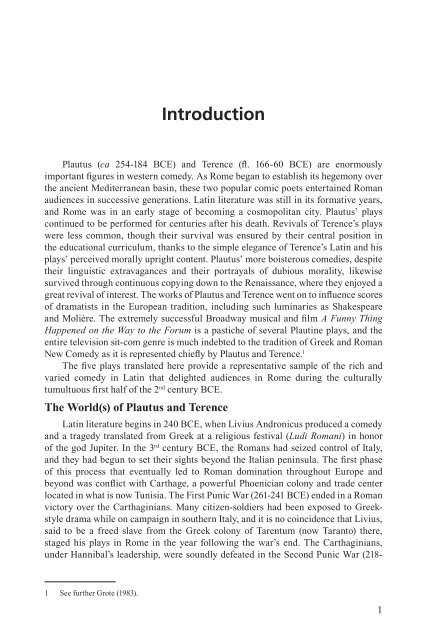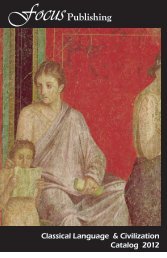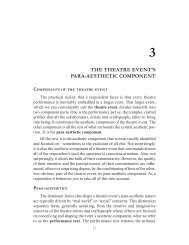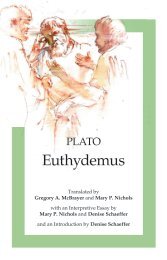ROMAN COMEDY - Focus Publishing
ROMAN COMEDY - Focus Publishing
ROMAN COMEDY - Focus Publishing
- No tags were found...
You also want an ePaper? Increase the reach of your titles
YUMPU automatically turns print PDFs into web optimized ePapers that Google loves.
IntroductionPlautus (ca 254-184 BCE) and Terence (fl. 166-60 BCE) are enormouslyimportant figures in western comedy. As Rome began to establish its hegemony overthe ancient Mediterranean basin, these two popular comic poets entertained Romanaudiences in successive generations. Latin literature was still in its formative years,and Rome was in an early stage of becoming a cosmopolitan city. Plautus’ playscontinued to be performed for centuries after his death. Revivals of Terence’s playswere less common, though their survival was ensured by their central position inthe educational curriculum, thanks to the simple elegance of Terence’s Latin and hisplays’ perceived morally upright content. Plautus’ more boisterous comedies, despitetheir linguistic extravagances and their portrayals of dubious morality, likewisesurvived through continuous copying down to the Renaissance, where they enjoyed agreat revival of interest. The works of Plautus and Terence went on to influence scoresof dramatists in the European tradition, including such luminaries as Shakespeareand Molière. The extremely successful Broadway musical and film A Funny ThingHappened on the Way to the Forum is a pastiche of several Plautine plays, and theentire television sit-com genre is much indebted to the tradition of Greek and RomanNew Comedy as it is represented chiefly by Plautus and Terence. 1The five plays translated here provide a representative sample of the rich andvaried comedy in Latin that delighted audiences in Rome during the culturallytumultuous first half of the 2 nd century BCE.The World(s) of Plautus and TerenceLatin literature begins in 240 BCE, when Livius Andronicus produced a comedyand a tragedy translated from Greek at a religious festival (Ludi Romani) in honorof the god Jupiter. In the 3 rd century BCE, the Romans had seized control of Italy,and they had begun to set their sights beyond the Italian peninsula. The first phaseof this process that eventually led to Roman domination throughout Europe andbeyond was conflict with Carthage, a powerful Phoenician colony and trade centerlocated in what is now Tunisia. The First Punic War (261-241 BCE) ended in a Romanvictory over the Carthaginians. Many citizen-soldiers had been exposed to Greekstyledrama while on campaign in southern Italy, and it is no coincidence that Livius,said to be a freed slave from the Greek colony of Tarentum (now Taranto) there,staged his plays in Rome in the year following the war’s end. The Carthaginians,under Hannibal’s leadership, were soundly defeated in the Second Punic War (218-1 See further Grote (1983).1
















